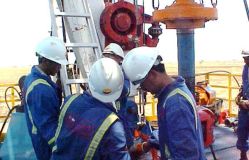Oil companies help develop south Sudan – at a price
April 11, 2006 (FALLOUJ) — Gleaming, whitewashed walls and a pharmacy brimming with medicine, Fallouj hospital in Sudan’s south is one of the best in the country. But in a nation plagued with epidemics, these serene wards are empty.

“This hospital was donated by CNPC, at the cost of $1.3 million,” said Sun Xiansheng, the president of Petrodar, the consortium which operates a project which runs 1,400 km to the eastern Port Sudan.
The aim is to help persuade impoverished locals to relocate from homes near the massive oil installation to a safer distance away. But residents said they were not being compensated for being moved from their homes.
Oil Minister Awad Ahmed al-Jaz told the local population they would be able to watch the soccer World Cup on the new satellite TV In June. But the crowd remained unimpressed.
“We need agricultural tools, tractors and ploughing machines,” said one protest sign at the oil pipeline’s inauguration ceremony, the signs carried by dust-covered, skinny villagers. Another asked for compensation to be given for the land the huge oil storage facilities were built on.
The pipeline will raise Sudan’s output to 500,000 barrels per day and has the potential to double that when other fields come on line. The discovery of oil in Sudan’s south was a catalyst for a bitter north-south civil war — Africa’s longest.
Southern Sudan has been devastated by more than two decades of civil war which claimed 2 million lives, mostly from famine and disease. With a peace deal last year, people are coming home, leading to overcrowding in urban centres and spreading epidemics of diseases like cholera and meningitis.
HOUSES NEEDED
The brand new hospital in Fallouj is empty but has the potential to help the villagers. If they move closer.
“They have to build houses for them here if they want them to move,” said local Paul Chol Deng. “And concrete ones, because if they provide electricity to the straw huts they will burn down,” he added.
But some thought it was still a good development. “I did a training course in nursing in Khartoum — maybe I could get a job here,” said Susannah Akueng.
Deng said the government had promised compensation for locals. But after accusations of forcibly moving populations and rights abuses in oil areas during the war, which prompted Western companies to pull out of the oil sector, distrust is high.
Sudan’s oil industry has little transparency and there is dispute over how much oil output really is. The sector is dominated by Chinese, Malaysian and Indian companies.
“We will wait and see if there is compensation,” said Deng.
(Reuters)
